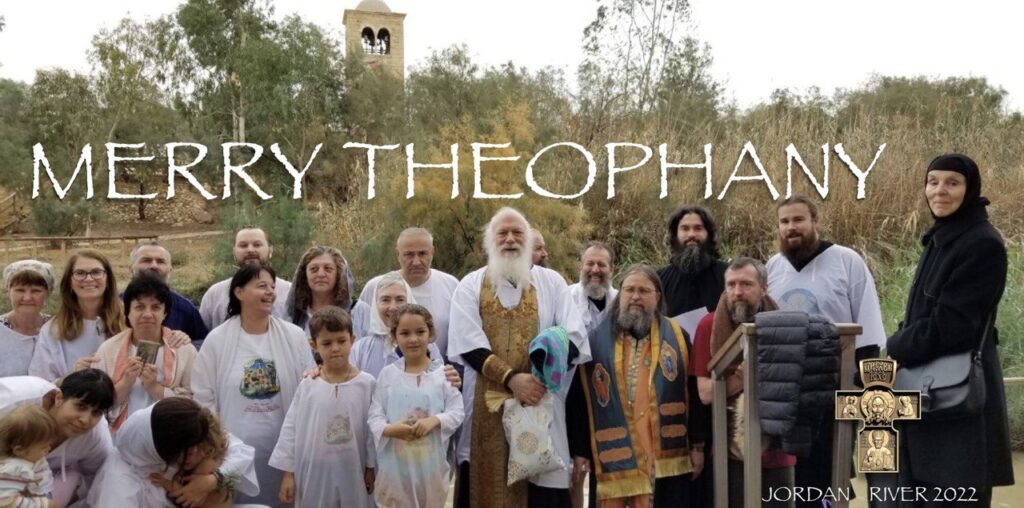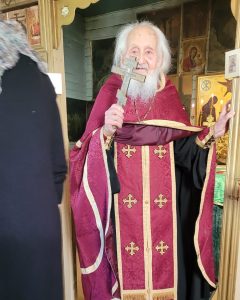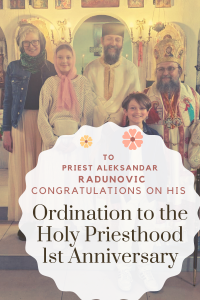ON THE FEAST OF THE ONE CRYING OUT “REPENT” ST. JOHN THE BAPTIST OF OUR LORD, AN ARTICLE ON REPENTANCE BY READER TIMOTHY
To the True Christian, repentance is a central mystery, perhaps the central mystery when it comes to our attempts to follow the instructions of Our Lord.
The Gospel of Matthew 4:17 informs us that the initial public preaching of Our Lord, the first words of His public ministry are just this: Repent: for the kingdom of Heaven is at hand.
This is not the first time we are told this, St John the Forerunner has been saying exactly the same thing (Matthew 3:2). Repent ye: for the kingdom of Heaven is at hand. This is the voice that is crying in the wilderness, it is repentance that will prepare the way for the Lord and make his paths straight. When we study Scripture, with the guidance of the Fathers and the services of the Church, we find that there are always literal and metaphorical meanings. The Divine is where the literal and the metaphorical meet, and it is this meeting, which can only take place in the human consciousness, in the human soul, that provides the personal proof of our Faith. But I digress.
In this instance, the paths of the Lord are the ways of the human heart, the inclinations of our souls. It is repentance that straightens these paths so that the Holy Spirit can enter unimpeded into our lowly souls and light them up with Divine Love, Understanding, and Wisdom. So what is it?
There are certain words and concepts that really are used, in their fullest sense, by the Church and by the Church alone. Repentance is one of them. In Greek, the word is metanoia, and means literally, ‘change of heart’ or ‘change of mind’ (it is perhaps worthy of note that people have not always considered the mind to be the seat of consciousness, in other ages, before the much-lauded ‘brain sciences’ of the present age, the heart was the seat of the ‘I’ of self). How can we characterise a change of mind that is this wondrous salvific repentance?
In the realm of consciousness, of the mind, our inner workings, we can talk of a change of intent, or a change of direction, a change of goal, or a change of orientation. This is part of it, but repentance is all of these things, plus something else. There is some ineffable quality here and I will not try too hard to define it, but I think that it is worthy of contemplating some of the things that are said of it, so that we can recognise it in ourselves (or the lack of it), and perhaps also recognise it when it happens in others.
The story of the Prodigal Son will perhaps always be my favourite of all the parables given by Our Lord. We have a clear and specific example of metanoia – repentance – and what it can consist of. The prodigal, when he reaches his lowest ebb, realising that the pigs he is feeding eat better than he does, and that he has foolishly rejected the love and care of his father, turns back. Repentance is a turning of sorts.
We turn away from our own self-made goals, our delusions, our wilfulness, having realised, by the Grace of God, that we were wrong. We realise that the Lord, Our Father in Heaven, provided everything we would ever really want or need. We realise that we were foolish not to trust in Him, and we decide that we will make our way back to Him so that we can beg forgiveness for the wrong we have done Him, the pain we have caused Him by running from Him, and beg that we be given the great mercy of being allowed to serve Him as the lowliest and worst of His servants.
I was with some old friends the other night, and I had cause to recount what had brought me to the Faith and ultimately to the True Church – Glory to God!
It was Christmas Day, 2019 (new style, I knew nothing then of the old calendar). I had spent the last few weeks working on a lengthy philosophical treatise attempting to make sense of the world as I found it. I had stumbled upon the proof of God first elucidated (in the present age), by Bishop George Berkeley, an Anglican bishop living in Ireland. Schopenhauer called him the ‘Father of Idealism’.
In brief, Berkeley points out that since nowhere can anybody even imagine anything existing without also there being the presence of a mind (your own mind imagining the thing existing), and nowhere can we find any object that we can be absolutely sure has existence when there is no mind to apprehend it, the persistence of the world can only reasonably (from present experience without inventing new, undefined and indefinable ‘somethings’, like a ‘Big Bang’ or ‘dark matter’ or ‘sub-atomic particles’ or ‘Higgs-bosons’ or what have you) be explained by the presence of an ‘over-mind’ that apprehends ‘all’ of it – in short, there must be a Divine Consciousness maintaining all of existence.
Philosophy schools not affiliated with a Christian* church will often try to skim over Berkeley, since he is ‘notoriously difficult to refute’ (read irrefutable). Secular philosophers are reduced to misusing words like ‘solipsism’ to sweep Berkeley under the carpet, and quickly move on to his more confusing and less helpful successors like Schopenhauer so that they can continue being secularist agnostics or atheists.
Anyway, my lengthy philosophical treatise on the meaning of words and of the findings of modern materialist science led me inevitably to the conclusion that since ‘all was mind’, then God was not just a theory or an idea, but a philosophical necessity. This was the beginnings of God leading me out of the maze of agnosticism.
I realised that since all was mind, and that I had control over my own mind, I should cease being cynical and start being happy and grateful for the good things in my life. The import of this realisation was marked by the fact that at that moment, my family were all sitting down to watch a Christmas movie – one of the Harry Potter films. Instead of finding fault with this absurd wizardry stuff, like I normally might do, I decided instead to ditch my cynicism and do my best to enjoy it, as a child might.
I plumped myself down on the sofa, resolved to ‘try my best’ to enjoy this film, just at the climactic moment when one of the characters comes back from the brink of death to rescue the eponymous hero with a spectacular pyrotechnic display, banishing hordes of monsters in the process. It was pretty awesome, tbh.
In the months that followed, I watched all the Harry Potter movies and started enjoying a great deal more family time, since I was no longer cynically not taking part in things or grumbling about them in the background (I’m mostly talking about Western Pop Culture stuff here). We started watching the Great British Bake Off together as a family, and, perhaps ten years after the rest of the country, suddenly got the baking bug. Together we all began taking turns to bake delicious things. I began eating sweets again whilst we played board games or went for early morning walks in the hills to see the sunrise with a flask of hot chocolate. It was all a bit famous five, and jolly good it was too.
There were some other things that happened that I won’t get into here, suffice to say, I was still full of the joys of life and ready to take on the world with my new attitude of seeing the good in everything when the whole world decided to close its doors and stage a mock viral apocalypse.
It was some time after that that I finally began to read the New Testament, but that is another story. Suffice to say that, as I related this story to my friends the other night, it was clear that the turning point had been that moment, on what I now know is the Feast of St Spyridon, when I decided that I was wrong, that perhaps ‘It was good’, as the Lord says it is in Genesis, and to focus on that instead of thinking everything was wrong and that it needed to be fixed.
This was the turning point that led me to realise, eventually, that it was me that needed fixing, not the world, and it was not just my attitude but my sinful soul that was lying beaten and bruised by the side of the road, robbed of my dignity and my birthright by my sinful passions and wilful ways. This was the point when I began to actively seek out the good. Two years later I was celebrating the Nativity with our parish in Guildford, and three years later, I was there again as a baptised True Orthodox Christian, an ordained Reader, and a pilgrim of the Holy Land, and I had my family with me too. Glory to God for all things.
My repentance has barely begun. I write this on the Feast of our Beloved St Seraphim of Sarov, whose example of repentance shows the insignificant softening of my hardened heart to be exactly what it is – insignificant, but nonetheless, God has, I think, granted me the Grace to make a good beginning. From my own sinful perspective, I feel exactly like the Prodigal Son, and despite my unworthiness,
I felt that our Father did not hesitate to ‘kill the fatted calf’ and put on me the robe and the ring, and I have felt that way, in one way or another, since that first moment when I ‘turned back’, when I first began to repent. May God forgive me for my continued foolishness and pride. I feel sure that the brethren, particularly my fellow pilgrims to the Holy Land feel the way I do, that is to say, unworthy of the wonderful wedding feast that God is throwing for all of us in the Heavenly kingdom and that we, as True Orthodox, by the Grace of God, get to glimpse and partake of as much as we are able in this life as we repent, pray, attend services, make pilgrimages and do our best to bring forth fruits worthy of repentance.
May God grant me, a more sincere repentance, more humility, and the ability to recognise my sinful nature and continue to repent of it. May God grant us all the gift of true repentance.




